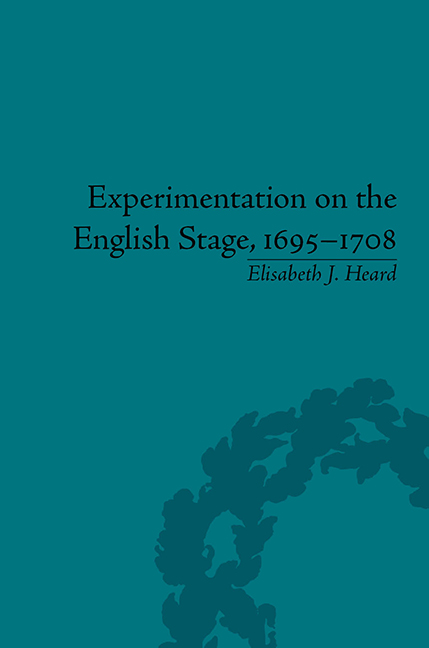Book contents
- Frontmatter
- CONTENTS
- Acknowledgements
- Introduction
- 1 The London Theatre World in the 1690s
- 2 Origins of ‘Humane Comedy’: Farquhar, Congreve, Cibber and Vanbrugh
- 3 Experimentation at the Turn of the Century
- 4 Successful Experimentation: The Recruiting Officer and The Beaux Stratagem
- 5 Farquhar's Contributions and the Post-1707 Theatre
- Conclusion: Farquhar and Anglo-Irish Drama
- Notes
- Works Cited
- Index
Conclusion: Farquhar and Anglo-Irish Drama
- Frontmatter
- CONTENTS
- Acknowledgements
- Introduction
- 1 The London Theatre World in the 1690s
- 2 Origins of ‘Humane Comedy’: Farquhar, Congreve, Cibber and Vanbrugh
- 3 Experimentation at the Turn of the Century
- 4 Successful Experimentation: The Recruiting Officer and The Beaux Stratagem
- 5 Farquhar's Contributions and the Post-1707 Theatre
- Conclusion: Farquhar and Anglo-Irish Drama
- Notes
- Works Cited
- Index
Summary
Farquhar and Anglo-Irish Drama
The goal of this book is to argue for the change in comedy at the turn of the seventeenth century and George Farquhar's contribution to that shift. As an Anglo-Irish dramatist, however, Farquhar also contributes to the history of Anglo-Irish drama as well. As an Irishman living in England, Farquhar would have been in a unique position. As part of English society he would have been familiar with social norms and customs, but as an Irishman, he would have been seen as an outsider and was more heir to the ‘Teague’ and ‘Paddy’ stereotypes instead of the privileges granted to English-born gentlemen. This insider/outsider status lies at the core of what made Farquhar an insightful satirist of English society. Farquhar faced many challenges in his life and frequently struggled to make a living through his writing. These struggles were compounded by the fact that he was engaging in a theatrical economy that wanted to see very particular images of the Irish on stage – that of the bumbling, foolish, unsophisticated ‘Stage Irishman’. What is a struggling Anglo-Irish playwright to do when faced with a society who wants to see a negative stereotype? With the exception of one character, Farquhar chose to use the tropes associated with the Stage Irishman and subvert them in a manner that satirizes the culture that perpetuates them.
Obviously, Farquhar is not the only Anglo-Irish dramatist to use his pen to satirize the English. However, he is frequently left out of the chronology of other great Anglo-Irish playwrights like Goldsmith, Sheridan, Wilde and Shaw. Farquhar's inclusion in this illustrious list is imperative because he was one of the first Anglo-Irish playwrights to achieve widespread popularity both in England and in Ireland on the stage and in print. With seven full-length plays and one one-act entering repertories all over England and Ireland, there was hardly a season where a Farquhar comedy could not be found being produced somewhere in either one (or both) of the countries.
This conclusion explores how Farquhar struggled against the ‘Stage Irishman’ stereotype, delicately balancing the audience's demands and his own desire to mock English society and still write a financially successful play.
- Type
- Chapter
- Information
- Experimentation on the English Stage, 1695–1708The Career of George Farquhar, pp. 135 - 146Publisher: Pickering & ChattoFirst published in: 2014

